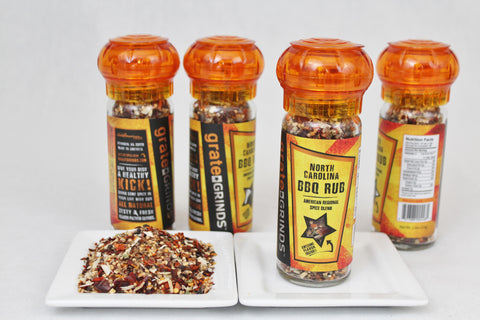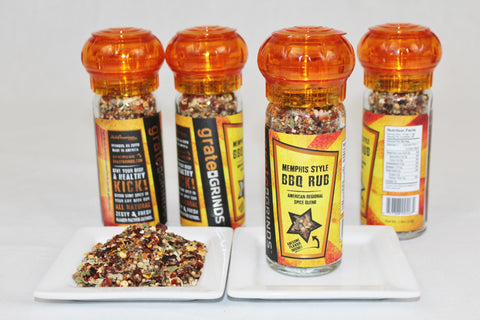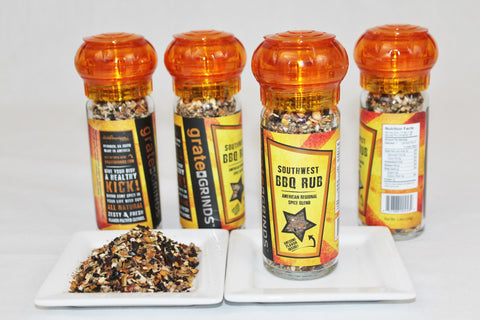St. Louis BBQ Rib Rub
St. Louis BBQ Rib Rub - Like all barbecue regions of the country, St. Louis, MIssouri has their own style of barbecue and here is pork ribs!. Here is our version of the St. Louis Rib Rub to complement the St. Louis barbecue sauce. Grind this rub blend on your ribs a few hours before smoking, grill or oven roasting.
Share this Product
St. Louis BBQ Rib Rub - St. Louis, Missouri is the home of St. Louis style pork ribs. These are the larger fatter ribs. The baby back or loin ribs are under the loin muscle next to the spine. The St. Louis ribs are further down the side of the rib cage and have the rib tips removed or squared off sometimes. Like all barbecue regions of the country, St. Louis has their own style of barbecue. Here is our version of the St. Louis Rib Rub to complement the St. Louis barbecue sauce. Grind this rub blend on your ribs a few hours before smoking, grill or oven roasting.
Spice Ingredients: Mustard seeds, hickory smoked sea salt, onion, New Mexican chile peppers, garlic, sugar, ancho chile peppers, cumin, black pepper and crushed red chile peppers.
St. Louis BBQ Rib Rub is available in a 4 oz. spice grinder bottle filled with 2.1 oz. of seasoning.
Please click on the RECIPE tab for detailed cooking instructions.
St. Louis BBQ Rib Rub Cooking Instructions
This rub is intended to be used on pork ribs and there are generally two common types of pork ribs available: St. Louis Ribs and Baby Back Ribs, see Figure 1, below.
NOTE: For more details about pork ribs and pork, please click on the RECIPES heading at the top of the Home Page and refer to the Pork Section of the "Recommendations for selecting your beef, pork, chicken, turkey and seafood" PDF .

Fig. 1. Side by side comparison of St. Louis ribs - square cut (top) and Baby Back ribs (bottom).
1) First remove the thin membrane from the back side of the ribs. See Figure 2., below. This membrane will not “melt” during the cooking process. It is not easy to do, but once you get it started with the tip of a knife or your finger tip, use a paper towel or thin cloth to grab the membrane and gently but firmly pull it off. It might not all pull off in one piece, so you might have to struggle pulling it off in annoying small pieces, but be patient. Hint: Start at the smaller end that doesn't have the meat flap. This is not a mandatory step, but it will make for a better eating experience.

Fig. 2. Removing the membrane from the back side of the St. Louis ribs.
2) To use the Grate Grind St. Louis BBQ Rib Rub , evenly spray or rub, a little oil on both sides of your pork ribs. Then grind the rub evenly on both sides of your ribs, gently pressing it onto the surface. The amount of rub you grind on is up to your flavor preference. The more you grind on the more of a flavor impact the rub will have. The Fig. 3, below is a sample of how much rub to grind onto your meat, as a general rule.
NOTE: One word of caution, these rubs are self-contained, meaning that they already have salt in them in the proper ratio to the spices and herbs, so don’t overdo it with grinding the rubs or add any additional salt.

Fig. 3 St. Louis and Baby Back ribs seasoned.
3) After you have rubbed your meat, refrigerate it and allow your rub to rest on the meat for at least 20 minutes or up to twenty-four hours.
NOTE: Always buy your meats from a quality reputable stores. Keep all meat under refrigeration as much as possible during preparation. Don’t leave any meats out at room temperature for more than 30 minutes, except when you are ready to cook it. Then let it just reach room temperature prior to cooking, but don’t let time exceed an hour. Food safe guidelines recommend that any proteins (meats in this case) are not exposed to the “Temperature Danger Zone” (40 F. to 140 F) for more than 4 hours for its entire journey to you cooking it. We are informing you of these food safety guidelines, because we want you to have a wonderful flavorful safe food experience, every time.
Barbecuing your pork ribs is a low heat, slow roasting method and it can be done in a smoker, barbecue grill or oven, technically. you will need to slow roast your ribs for 2 ½ to 3 ½ hours, depending on your oven or grill and amount of ribs being cooked.
SMOKER:
Preheat your smoker to 250-275° F. Place your seasoned ribs away from the direct heat source or smoke box. Rotate your pork every two hours to keep the smoking and temperature evenly around the ribs. Remember to resupply your smoking medium so the temperature remains constant throughout the cooking time. The cooking times can very from a few hours to 6 hours. It really depends on the temperature and type of smoker you have and the amount of ribs you are smoking. (Final cooking instructions are below)
BARBECUE GRILL or OVEN:
1) Turn on all the gas valves or get all the coals hot and preheat your grill (oven) to 400° F to 450ºF. so the meat will sear rapidly sealing in the juices caused by this initial high heat process. Then turn off the gas burners on one side of the grill or move the coals to one side of the grill and place the pork ribs on the side with no gas or coals directly under the meat being cooked. This is called indirect cooking. Place your pork ribs on that side of the clean, oiled preheated grill. This searing process should take around 15 to 25 minutes, depending on the size and quantity of your pork ribs and the type and temperature of your grill. Your grill temperature should start to drop down and adjust it to around 275ºF to 300ºF. . Now your job is not to touch the meat or open the lid or door too often. Have a beer or soda, mow the lawn, watch a football game! The time it takes to barbecue your ribs depends completely on the temperature of oven, grill or smoker and the size and quantity of the ribs.

Fig. 4. Baby Back ribs (bottom) and St. Louis ribs (top) on the grill to be barbecued. Smoking chips next to them.
7) Don’t overcook them either. To barbecue your ribs properly, allow at least 2 ½ to 3 ½ hours. The key to the correct doneness of your slow cooked ribs is to get the internal temperature (with an instant read thermometer) of the meat up to 190ºF., but not more. You can get there in 2 hours if you push the temperature up, but the ribs will dry out, if you cook them too quickly. While cooking your ribs, occasionally check the temperature of the pork, so they reach the 190ºF. doneness temperature. The meat should have pulled back a little off the rib bones. It should not completely fall apart when you gently try to pick it up the entire rack, but if you pull off pieces of pork they should come off easily. You should be able to cut in between the rib bones cleanly without the meat shredding, as shown below in Figure 6.

Fig. 5. Baby Back and St. Louis ribs barbecuing.
8) Once you feel your ribs has reached the proper temperature (190 F.), remove them from the grill or oven and let them "rest" under a foil tent. There is an activity that takes place now called “carryover cooking”. Once your food is removed from the heat source, it will continue to cook for 5 to 10 minutes for smaller cuts, 15 to 20 minutes for larger cuts of meat. The retained heat in the meat continues the cooking process for a few more minutes, as the meat cools down. Part of the resting period is to allow the internal liquids in the meat, which are forced to the center by the intense cooking heat, and it will take a few minutes for the liquids to redistribute themselves throughout the meat.

Figure 6. Sliced St. Louis barbecued ribs. Happy eating! Use your favorite barbecue sauce, if you wish.
NOTE: For more detailed cooking instructions, please read the "Detailed Instruction for Barbecuing, Grilling and Oven Roasting" PDF located in the RECIPE heading at the top of the Home Page.
 PROUDLY MADE IN AMERICA
PROUDLY MADE IN AMERICA












